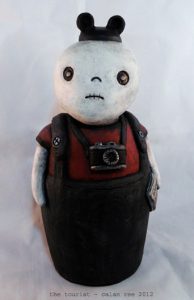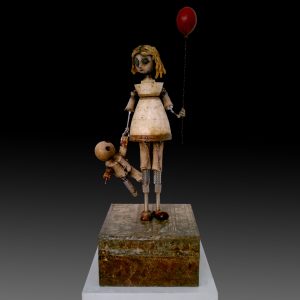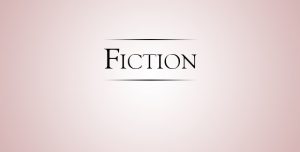
By Andi Tomassi and Calan Ree
Tampa Review Online: How long have you been a working artist? What caused you to move in this direction?
Calan Ree: I feel like I have always been an artist and every path and direction I’ve ever taken has ended me up here…making art…where I’m supposed to be. If you want to know how long I’ve been selling art, well I think the first ‘show’ was in my front yard with play-doh pinch pots and figurines when I was around 7. It wasn’t a very successful show. I believe I had one sympathy sale from a neighbor and a few ‘tips’ like, “you should try selling lemonade.”
TROn: How would you describe your studio process? What are your rituals?
CR: Sometimes I sketch first, just enough to have a vague idea of the direction I want to go in. Sometimes I gather bits of nature and rusty debris I’ve gathered on walks. I usually have a vague idea of what I want to create, but with clay you have to also listen and look and see where it leads you. Often it’s not where I might have expected to go, but I’m pleasantly surprised at where it takes me.
I work in my home studio, aka my kitchen. The kitchen table holds works in progress and there are some shelves for clay work that is drying or awaiting finishing. The atmosphere is hardly ever silent. The ipod is updated weekly with various podcasts – mostly story telling, some science and weird news (This American Life, Snap Judgment, Strangers, Mysterious Universe, Stuff to Blow Your Mind, Home Town Tales, etc.) If I’m not listening to podcasts I’m playing music (Amanda Palmer, Dresden Dolls, Dead Can Dance, She Wants Revenge, New Order, Cure, Interpol, Portishead, etc.) I work when the Muse strikes which can be any time of day.
TROn: Can you boil down your artist philosophy into a few sentences for our readers?
CR: Sure. How about, ‘Just do it.” Original, right? Seriously, just make art, play music, write, whatever. Stop worrying about what anyone thinks or whether it will sell or whether it’s good enough and just do it. The times in my life when I was only thinking about or stressing about making art and not actually finding the time to allow myself to create coincide with some of the worst times in my life. I think this is correlation and not coincidence.
TROn: What came first, the chicken or the egg (materials vrs. concept)?
CR: Concept because I can come up with an initial idea and then choose to execute it in clay or ink or pixels or paint…but with clay it often feels like the material is leading me to the concept….but usually there is an initial idea sparking the desire to start playing with the clay so I’m back to concept…ugh. Yeah, I’ll just go with concept on that one.
TROn: Which is your personal favorite piece?
CR: That changes all the time. Typically, it’s whatever I’m currently working on. I seriously have had little relationships with each piece I’ve ever sold and at times it’s been hard to see them go. I really loved Muse and Mister Moon was another fave but both went to super cool collectors so it felt good to release them. Oh gosh, now I’m remembering some others…there was this finger puppet I called Mister Ouch, he had these vintage rusty removable tacks…and these surprised eyes and O shaped mouth…. oh, boy there were a few others as well….I’m going to stop thinking about them before I want them all back.
TROn: What do you have in the works now?
CR: I’m working on slightly larger than life wall hanging with a vintage circus theme. This summer I’ll be making pieces to show in this year’s annual For the Love of Clay – A Juried Exhibition which will take place at the Studio@620 [in St. Petersburg, FL] in November. I’m also working on a very exciting illustration project – more details later this summer.
TROn: What if our viewers want more of Calan Ree? Where can they find your work?
CR:
CalanRee.com has the blog and links to online shops and galleries. I’m also easy to friend and keep up with on Facebook.
Elusia and DreamSeed
Forest Folk
Love Endures
Mr Moon
Muse
Past Bedtime
The Tourist
============================================================================
 Originally from New York, Calan Ree has called St. Petersburg, FL home for over a decade. Her work can be found in local galleries and boutiques and ranges from her Burtonesque GingerDead greeting cards to her figurative ceramic and mixed media sculptures and hand-built illustrated pottery. Ree explains that in all of her work, whether it’s a bit macabre or sad or silly, there is a conscious effort made to find a way into the viewer’s heartstrings and give a gentle tug.
Originally from New York, Calan Ree has called St. Petersburg, FL home for over a decade. Her work can be found in local galleries and boutiques and ranges from her Burtonesque GingerDead greeting cards to her figurative ceramic and mixed media sculptures and hand-built illustrated pottery. Ree explains that in all of her work, whether it’s a bit macabre or sad or silly, there is a conscious effort made to find a way into the viewer’s heartstrings and give a gentle tug.
Andi Tomassi graduated from the University of South Florida with a dual-major BA in Visual & Performing Arts and Art Education. She is currently an MFA candidate at the University of Tampa.

 Originally from New York, Calan Ree has called St. Petersburg, FL home for over a decade. Her work can be found in local galleries and boutiques and ranges from her Burtonesque GingerDead greeting cards to her figurative ceramic and mixed media sculptures and hand-built illustrated pottery. Ree explains that in all of her work, whether it’s a bit macabre or sad or silly, there is a conscious effort made to find a way into the viewer’s heartstrings and give a gentle tug.
Originally from New York, Calan Ree has called St. Petersburg, FL home for over a decade. Her work can be found in local galleries and boutiques and ranges from her Burtonesque GingerDead greeting cards to her figurative ceramic and mixed media sculptures and hand-built illustrated pottery. Ree explains that in all of her work, whether it’s a bit macabre or sad or silly, there is a conscious effort made to find a way into the viewer’s heartstrings and give a gentle tug.
















